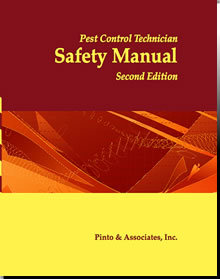

Archive of Recent Safety Articles
|
|
Written in plain English, with easy-to-follow safety instructions. More than 50 safety topics included. |
|
Recent Technician Safety Articles from Techletter.com
- Pigeons and Disease: How Much of a Health Risk Anyway? Without a doubt, pigeons carry human pathogens. But do those pathogens pose significant risks to pest control workers or the public? It's not a simple question and doesn't have an easy answer. Full story
- Avoiding Bed Bugs During Bed Bug Work. A technician risks bed bug bites and carrying bed bugs home, especially in heavy infestations, and particularly if the technician leans against or sits on an infested bed or couch and a bed bug transfers to the technician’s clothing. Full story
- Dealing with a Damaged Pesticide Container. A leaking pesticide container demands immediate action. Put on any personal protective equipment, such as rubber gloves or goggles, that is required or suggested on the label. If the leaking is severe, first contain the leak. Full Story
- Safety Manual Excerpt...Hantavirus. Hantavirus is a rare but often fatal disease caused by a virus most commonly carried by the deer mouse and, in some areas, other species of mice such as the white-footed mouse. While rare, hantavirus is of special concern because of its high fatality rate. Full story
- Safety Manual Excerpt...Confined Spaces and Pest Control Technicians. Imagine yourself stuck in a sewer manhole as the water level rises. Or sinking in stored bulk grain and unable to breathe as the grain closes over your head. Or trapped in an elevator pit as the elevator slowly crushes you. Such thoughts could give you nightmares! Full story
- Gasoline Safety Hazards in Pest Control Work. Gasoline ignites easily, burns vigorously, and may explode. Unless you are a fumigator, gasoline is the most dangerous material you use. Unfortunately, most of us are so familiar with gasoline that we tend to ignore its hazards. Full story
- Avoiding Hookworm or "Creeping Eruption". While an animal hookworm is primarily an intestinal parasite of domestic and wild animals, people become infected through contact with an infected animal’s feces, usually from dogs, cats, or raccoons. The results can be uncomfortable, disturbing, and even dangerous. Full story
- Pest Control Work and Hazards from Natural Gas and Gas Appliances. The biggest hazard to pest control technicians from natural gas comes from pest control work in, around, and under gas appliances. Be careful if you pull out gas stoves or gas dryers for inspection or treatment. Old, corroded, or too-short corrugated gas connectors can break. The older the connector, the greater the possibility of failure. Full story
- How to Protect Yourself Against Hearing Loss. Twenty-eight million Americans have some kind of hearing impairment. More than a third suffered their hearing loss as a result of exposure to loud noises. Pest control technicians are most often exposed to loud noises while using hammer drills in termite control, while operating fogging equipment, and when doing pest control in manufacturing plants. Full story
- ...more coming soon
